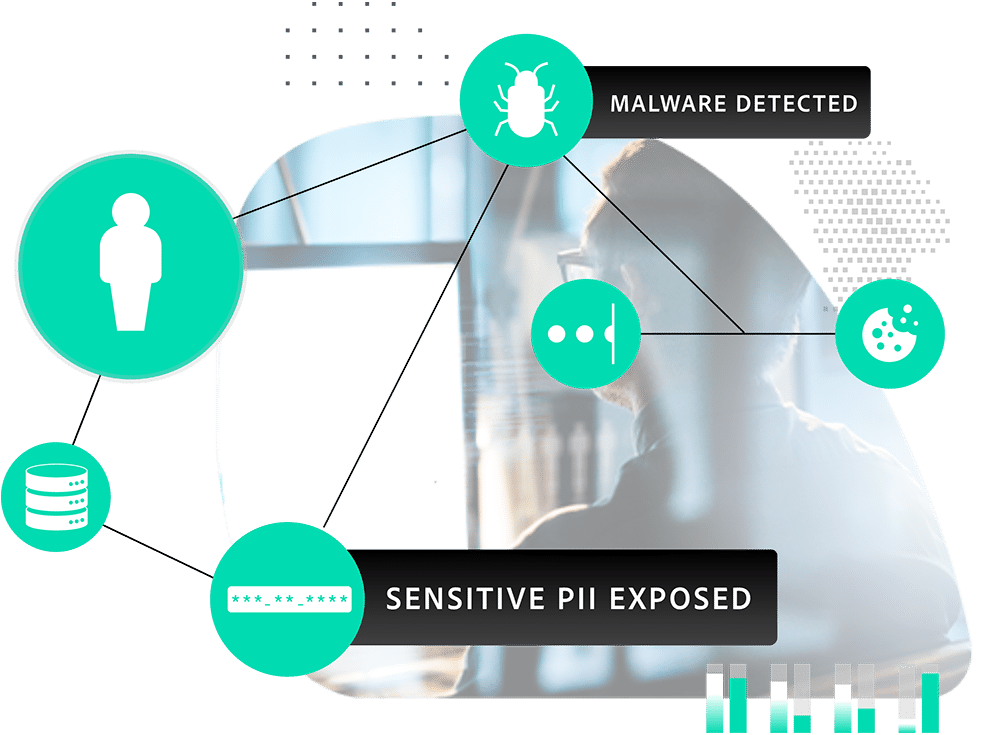Industry: Government
Federal mission support, powered by Cybercrime Analytics
SpyCloud empowers government agencies to achieve their most challenging mission objectives. With vital data from the criminal underground that powers threat actor attribution, pattern of life analysis, and automated account takeover and ransomware prevention, SpyCloud’s Cybercrime Analytics solutions proactively protects the infrastructure, national security, and customers of government services.
WHO USES SPYCLOUD?
A glance at government security risk
SpyCloud’s exposed authentication data contains .gov employee and contractor data from third-party breaches and malware-infected devices.
67%
Password reuse rate for .gov emails found in data breaches last year
61%
Percent of credentials exfiltrated by malware (vs data breaches) last year
11,000+
Malware infections
among the top U.S. defense contractors
Leverage darknet insights for national security

Exposed authentication data and PII are fuel for cyberattacks that threaten government entities and our national security. But that same data can be used as a force multiplier, providing early warning of breach incidents and an analytical perspective on the threat actors’ behavior. SpyCloud has built the industry’s fastest and most innovative approach for detecting and mitigating darknet exposures to prevent attacks – and de-anonymizing the bad actors who perpetrate them.
Access enriched identity intelligence
SpyCloud's publicly available information (PAI) repository contains recaptured underground data from breaches, malware-infected machines, and other covert sources. Benefit from the most rapid delivery of relevant, reliable, ready to implement decision-quality identity intelligence to better understand the adversary’s behavior and potential motivations.
Investigate cybercrimes and profile actors
Using our vast amounts of recaptured data, analysts are able to make connections between individuals and organizations they never thought possible to quickly identify threat actors and unmask alternate identities through repeatable, scalable analysis.
Identify & remediate high-severity risks
Infostealer malware exfiltrates credentials, cookies, auto-fill info, and device data that enables user impersonation and follow-on attacks including ransomware. SpyCloud detects, remediates and provides forensics on infected .gov users so you can comprehensively defend your network.
Get training and support
At times, additional expertise and support helps agencies expedite critical analysis, decision processes, and intelligence cycle. SpyCloud offers both hands-on training and analyst support services to ensure rapid deployment and mission success.
IMPACT OF SPYCLOUD
A government agency was the target of a credential stuffing attack. When their legacy solution failed to detect exposed credentials at the percentage they expected, SpyCloud was able to provide a file of 6,500 malware-infected user machines linked to their domains. Our results revealed that 85% of these 6,500 records had a direct credential match (email address and plaintext password) to active accounts. Using the potential cost of the identity theft prevention services for these malware-infected machines, the agency calculated their “avoided cost” at $552,500.
What else can I do with SpyCloud?
You might like:
Dive into our process
Only SpyCloud delivers actionable insights powered by Cybercrime Analytics.
Experience Cybercrime Analytics
See why agencies around the world choose SpyCloud as a force multiplier.
Learn more about cyber trends
Our annual report includes key trends about government employee malware and identity exposure.
